FAQ: How Do Dental Implants Work?
What Is a Dental Implant?

A dental implant is basically a replacement prosthetic tooth that looks and functions just as natural teeth do, only one that lasts longer and is more durable!
When your adult teeth are casualties in the battle against decay and aging, you are left with an incomplete smile and many deteriorating emotional and physical health conditions. Thankfully, with advanced dentistry procedures, Dr. John Minnoch at Bellevue Dental Care & Implant Center of Washington can use dental implants to complete your smile if you are missing 1) all your teeth, 2) multiple adjacent teeth, or 3) just a single tooth—no matter how many years have passed!
Did You Know?
How Do Dental Implants Work and How Much Do They Cost?
You only get two sets of teeth in life; so when you are missing one, several, or all your teeth, you need another chance at a gorgeous smile – done right the first time.
- Can I get dental implants if I have had missing teeth for over 10 years?
Absolutely! If you’re among the hundred million American adults who are missing 1, several, or all your teeth (a former denture wearer) then dental implants may be the perfect solution for you! Just schedule a consultation with Dr. John Minnoch to see if your jaw bone and gum health are in optimal shape for the implant procedure.
- Should elderly individuals get dental implants?
This answer depends more so on your oral health condition. People and habits vary, so an individual with good oral health habits and who has tended to their smile by means of regular checkups could be more eligible for the dental implant procedure than a younger individual who has not cared for their smile as much. In addition, other health conditions, such as diabetes, may also have a bearing on the matter. So it is best to consult with a dental implant expert like Dr. John Minnoch before making a decision for your smile.
- What can dental implants fix? And what are the benefits?
It can be easy to underestimate the effect missing teeth can have on a loved one if one has all their teeth. If you have gone 5 or 2 years hiding your smile out due to embarrassment, you can understand how degrading it can feel to smile half way all the time. More than likely, you have not been able to enjoy your favorite foods the same way. Or maybe you have lived with uncomfortable dentures and hold back from speaking or laughing because you’re afraid of calling attention to the denture’s clicking sounds.
Also, there is a domino-effect health hazard that results from missing teeth for too long such as losing more teeth and damaging the ones you still have.
Dental implants can FIX ALL OF THIS! Yes, you can smile big, laugh out loud, and eat whatever you want with a complete smile. That’s why we are in this industry to give people back their dignity and health.
- How much do dental implants cost?
Without the help of a dental insurance or discount program, the cost of dental implants can vary anywhere between $1500 – $6000 USD for a single unit including the cost of the materials and the surgical procedure. Why the gap in the price range? Because there are so many other factors to consider when selecting the type, procedure, and the number of implants to use when performing oral surgery.
Often we can minimize costs by being proactive and smart about the placement of the implant posts, maximizing space and function while being conservative on costs. There are many other ways to finance your dental implants, and we would be glad to help you! From working with your insurance company to providing guidance, and even accepting third-party financing for your dental implants, we can help make your smile whole once again—while keeping it within your possibilities.
- What can I expect with the implant process? Planning. First, is the planning stage where you will have a 3D Cone Beam image taken of your mouth for properplanning of the implant placement.Procedure. Once everything is planned with computer-like precision, on the day of the surgery we will get you all comfortable and relaxed. Dr. Minnoch offers various forms of sedation dentistry for different types of patients and fears. Once you’re ready, the implant location is prepared and then implant post is placed.Healing. For most patients, there is a 3 to 4 month healing time during which we allow time for the implant to integrate to the bone.Restoration. Once the post fuses with the jaw bone, then Dr. Minnoch will restore the tooth by having a gorgeous natural-looking prosthetic attached on top!
- What technology does Dr. Minnoch use for dental implants? Dr. Minnoch uses the 3D Cone Beam imaging technology for all surgical planning. This technology is more accurate than traditional impressions and is more advanced since it enables us to accurately plan the implant process.We also use CEREC same-day in-office dental restorations, so your new tooth is ready in just a single appointment! At other dental offices, to place the final crown (tooth) on top of the healed implant used to take up to 3 to 4 different appointments weeks apart at times!Our investment in advanced technology is for the benefit of our patients. We want dentistry to be easy, convenient and done right the first time, so all you have to worry about is smiling uncontrollably.
- How long will the dental implant process take?The time to complete the dental implant process can vary, but the average treatment is 3 to 6 months.
For example, an immediate implant for someone who just had the tooth extracted will be a lot faster than say, replacing a tooth that was removed or lost over six months ago, in which case jaw surgery and bone grafting would be needed.Most of the time required to complete implant treatment is taken up just waiting for the bone to fuse completely with the implant. This usually takes a few months and goes on below the gum line without any feeling or awareness. The healing time may vary depending on your health condition (how long your body takes to respond) and in more complex cases, treatment may be longer than six months.Scheduling a consultation with Dr. Minnoch will help paint an estimated date more accurately for your unique circumstances. - Will I be without my teeth while waiting for the implant to heal?For patients receiving an implant in the back section of their mouth (not easily viewable when you speak and smile), waiting about 4 months is typical and many patients are fine waiting for this short period.In other cases, a temporary tooth (either fixed or removable) will be placed the same day so we don’t send you home without a smile!
- What happens if my dental implants fail?Although implant failure is considered rare, it can occur since this is a surgical procedure. In these cases, the failed implant can be replaced with another.
- Are Screw-Retained or Snap-On Implants Better?
Which option is the best for you must be decided by the results you want and your budget. Screw-retained implants are permanently attached, look great and made with porcelain, whereas a better option for older patients or those who don’t want to commit to permanent dentures may be snap on.
Check out this thorough comparison of the two options, including an actual patient testimonial relaying her decision and results.
Getting dental implants with Dr. John Minnoch will re-empower you to feel whole again.
What Do Dental Implants Look Like?
Our advanced dental implants are made up of sturdy and durable materials that will fuse with the jaw bone like natural tooth roots and last a lifetime with proper care. There are three parts to a dental implant, and they look something like this:
*Some materials can vary depending on your health conditions and needs.



Now offering:





